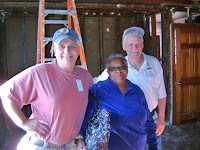I’m tired.
This has been a busy week at work and I’ve been working hard to finish the ten gallons of soup for Empty Bowls tomorrow night, which meant I spent every spare moment of the last couple of days chopping and dicing until my hands are rough and cracked. Though dinner went well tonight, I spent the whole evening feeling a step behind and out of sync.
I’ve now been sitting in front of a blank page for the last hour and a half, trying to figure out what I had to say on a night like this. I got tired of staring and went looking for what others had to say, which led me to this video clip posted, on Cecilia’s blog, of folksinger Peter Mayer singing his song (new to me), “God is a River.” I’ve included the lyrics to read as you listen.
In the ever-shifting water of the river of this life
I was swimming, seeking comfort; I was wrestling waves to find
A boulder I could cling to, a stone to hold me fast
Where I might let the fretful water of this river ‘round me passAnd so I found an anchor, a blessed resting place
A trusty rock I called my savior, for there I would be safe
From the river and its dangers, and I proclaimed my rock divine
And I prayed to it “protect me” and the rock replied
God is a river, not just a stone
God is a wild, raging rapids
And a slow, meandering flow
God is a deep and narrow passage
And a peaceful, sandy shoal
God is the river, swimmer
So let goStill I clung to my rock tightly with conviction in my arms
Never looking at the stream to keep my mind from thoughts of harm
But the river kept on coming, kept on tugging at my legs
Till at last my fingers faltered, and I was swept awaySo I’m going with the flow now, these relentless twists and bends
Acclimating to the motion, and a sense of being led
And this river’s like my body now, it carries me along
Through the ever-changing scenes and by the rocks that sing this songGod is a river, not just a stone
God is a wild, raging rapids
And a slow, meandering flow
God is a deep and narrow passage
And a peaceful, sandy shoal
God is the river, swimmer
So let goGod is the river, swimmer
So let go
One of the ways I was taught to unpack dreams is to look at what happened in the dream from the perspective of each person or thing in the dream. As a youth minister, I found it was a great approach to looking at different Bible passages – especially the parables. What did it feel like to be the prodigal son, the father, the eldest son, the servants, the pigs? What I like best about the approach to either subject is it calls me to look at the interconnectedness of the metaphors, and the consequences of interpretation.
Mayer’s image isn’t new. He’s leaning into those who have sung before him:
like a river glorious is God’s perfect peace
overall victorious in its bright increase
perfect yet it floweth fuller everyday
perfect yet it groweth deeper all the way
What he does with the image that knocks me out is put us in relationship with the metaphor. His is not abstract poetry; we are called into the action with an amazing line:
God is a river, swimmer
He names God, and then he names us. The metaphor would mean something different were we fishing, or farming, or building bridges, or (as Loggins and Messina used to sing) watching the river run. But in this story, we are in the water — not taking from or adding to or going around or sitting it out; we are in the river, swimming.
I’m grateful for such an image to feed my dreams tonight.
Peace,
Milton
